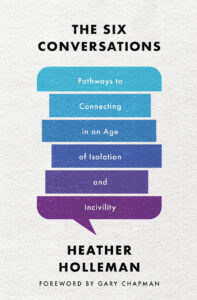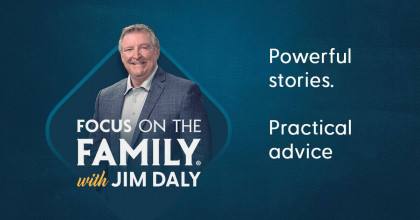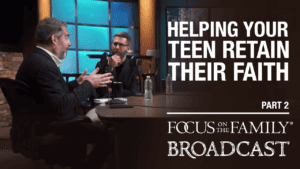Announcer: The following program is sponsored by Focus on the Family, and is supported by the prayers, and financial gifts of wonderful friends like you.
Heather Holleman: All the research shows that if you stop to have a loving conversation, you’re improving your mental health, and your physical health.
Jim Daly: Huh.
Heather: Lonely people, even in the home, you’re, I mean, you’re increasing your chance of premature death by 32%. If you read the Surgeon General’s report that came out last year on loneliness, you’ll, you’ll think to yourself, “I have got to slow down. I’ve got to make room for warm connections in my family.”
John Fuller: Hmm. Dr. Heather Holloman joins us today along with her husband Ashley, on Focus on the Family with Jim Daly. And thanks for joining us. I’m John Fuller.
Jim: I am super excited for the conversation you’re about to hear with Ashley and Heather. Uh, before we dive in, I wanna share something close to my heart, a unique opportunity for you to make a real difference. Uh, you may have heard that this past summer was financially challenging for us. It just kind of flattened, or fell off, really. And as we approach the end of our fiscal year, we’re prayerfully looking ahead, and we need some friends of the family to come alongside us in this vital work. Here’s why your help matters. When you give, you’re not just donating. You’re helping couples build stronger marriages, equipping parents for every stage of parenting, and even saving the lives of moms, and babies. Think about the ripple effect of that impact. It’s incredible.
And right now, for this week only, we want to say thank you in a special way. When you commit $30 a month, we’ll send you a Focus on the Family with Jim Daly Travel Mug. It sounds funny to even to say with, uh, four-ounce bag of, of my own coffee blend that John Fuller (laughs) has procured somehow. And it’s the same coffee we enjoy here in the studio. If Focus on the Family has encouraged you, or your family, would you take this moment to partner with us, kind of pay it forward. Your support means changed lives, stronger families, and a brighter future.
John: Yeah. Donate today. Uh, if you can make that $30 a month pledge, and you’ll get the coffee, and the mug that we enjoy, and use (laughs) here in the studio, uh, that’s a limited time offer, and our number is 800, the letter A, and the word FAMILY, (800) 232-6459. Or you can donate, and request the coffee, and mug, uh, at focusonthefamily.com/broadcast. And as I said earlier, we have a terrific conversation ahead with Ashley, and Heather Holloman. They’re the parents of two daughters, and, uh, Ashley serves as executive director of Seated & Sent. It’s a ministry he, and Heather founded. Heather is an associate teaching professor of advanced writing at Penn State, uh, she’s a speaker, and an author, and we’ll be talking about her terrific book. It’s a really great resource, The Six Conversations: Pathways to Connecting in an Age of Isolation and Incivility. Get a copy of the book from us here at focusonthefamily.com/broadcast.
Jim: Ashley, and Heather, welcome back. So, good to have you again.
Heather: We’re excited to be here.
Jim: Yeah.
Ashley Holleman: Thanks for having us.
Jim: You know, it’s always good, people really lean into this discussion on communication.
Heather: Yes.
Jim: So, you, you’re really hitting something that’s very important to people. People have a… Are expressing a need, and that’s why so many people respond. And I think it’s a good thing. You know, when we talk about communication, we’ve covered that with marriage, and other broadcasts, and I want to encourage people, if you haven’t heard that, uh, go ahead, and get it for your, the app, for your smartphone.
John: Mm-hmm.
Jim: And you have the whole library of, of broadcasts, and podcasts. And it’s a great way to go back and listen to the library of content. Uh, let me start with you, Heather. Uh, you’re a professor at Penn State. You’re working with young people. We’re talking today about parenting. So, you’re getting the immediate byproduct of us parents.
Heather: Right, right. (Laughter)
Jim: And they’re coming into Penn State. And that’s your view. What do you see in that student body coming in now, and you know, the area of loneliness, and lack of connection that you’re observing? Just paint a picture for those of us that aren’t on a college campus very often.
Heather: Well, one thing I’m observing is actually good news. And the good news is they know that they’re lonely. They know that they’re experiencing a sense of meaninglessness. They’ll say sometimes they feel empty inside.
Jim: Huh.
Heather: Which means they’re really searching. So, at least at Penn State, we’ve seen Christian Campus ministries just thrive. People are-
Jim: That’s amazing.
Heather: Young people are returning to church. They’re returning to the wisdom of their elders. They’re trying to figure out, “Wait, we’ve been kind of lied to by the culture. Something’s not right. This doesn’t feel good. Why don’t I think about some spiritual questions?” So, I’m seeing a lot of students for the first time really asking me like, “Okay, how did you choose Christianity? Or Why do you follow Jesus?” And we’re actually seeing students make professions of faith. One of my students was baptized at Easter. I had many conversations with students just wanting to know, “Okay, what do I need to know about God? What do… Where do I start reading the Bible?” So, there’s some good news there, but I will say they do feel deficient in what I call interpersonal connection.
Jim: Um, our kids are growing up in a world of incivility. We know that. So are we, by the way, we’re living in a world of incivility. Um, what does that impact, do you think, the polarization, you’re on a college campus, so you’re seeing it. What are some keys we can teach our children to dialogue differently?
Heather: Right. Well, the one thing we’re teaching our daughters, and what we teach young people, is just those principles of the four mindsets of a loving connection. That your job isn’t to win arguments with people. Your job is to be curious, believe the best about them, express concern, and share your life. And just get to know the story behind people. And that you can really form warm connections anywhere you go. That’s hard for them because they, a lot of the research I did with Ash when we, when I was writing The Six Conversations had to do with young people are often addicted to drama, and controversy.
Ashley: Mm-hmm.
Heather: So, they kind of feel most alive when they’re in an argument. That’s kind of changing. We’ve really been speaking into that saying, “You know, your job is not to walk into a setting, and express outrage, and nobody cares that you’re offended anymore.” That’s an old story.
Jim: That’s a great line.
Heather: That’s an old story.
Jim: We’ve all become immune.
Heather: So, I tell my students, uh, you know, outrage, and being offended is not persuasive anymore. And they love it because they’re tired of it too.
Jim: Yeah.
Heather: So, we tell our daughters, you know, just go into any setting, and try to find the wisdom there from people. Learn from them.
Jim: Yeah.
Heather: And that’s really helped their interactions. They’re adults now, but we have a lot of young neighbors on our street, and we love just engaging them, and using the principles of The Six Conversations to connect with young people. It’s been a wonderful journey for us to do that.
Jim: Yeah. Just to punch that, and you’re so good blending the scripture in that really calls like Romans 2:4.
Heather: Yes.
Jim: Don’t you know it’s God’s kindness that leads one to repentance?
Heather: Yes, yes.
Jim: I’ve often said it at places I speak. Has anybody got the testimony in here that the Christians treated you so poorly, they were so hate-filled towards you-
Heather: Yeah.
Jim: That you decided to become one of them?
Heather: Oh, gosh.
Jim: Right. Nobody is …
Heather: Yeah.
Jim: It’s always, they acted uh, differently. And it’s really your book in that you’re teaching people how to have conversations that open hearts.
Heather: Right.
Jim: It doesn’t close hearts.
Heather: Right.
Jim: And you do need to be thoughtful about that. Let me just refer to scripture. I love this in second Timothy. I quote it often, but I’d love both of your responses to this, and I know you’ll connect with it where it says, “Have nothing to do with foolish, ignorant controversies.” Man, it, it’s like our human flesh goes right there, right? Cable news. But it goes on to say, “You know, that they breed quarrels, and the Lord’s servant must not be quarrelsome, but kind to everyone, able to teach patiently enduring evil, correcting his opponents with gentleness.” Bam. And then here’s the payback. “God may perhaps grant them repentance leading to a knowledge of the truth. And they may come to their senses, and escape from the snare of the devil after being captured by him to do his will.”
Heather: Great.
Jim: And that’s like our job, uh, …
Heather: That’s great.
Jim: …you know, job performance right there. It’s how to do that. But just connect with that scripture in terms of, um, you know, the attitude of the heart.
Ashley: Yeah. I remember this years ago when our girls were, you know, were small, and they were just acting, back to what Heather was saying about the drama, about just everyone acts like they’re in the middle of a great drama. And I was like, “Where are they getting this from?” And I started watching a little bit of the TV they were watching, and that’s exactly what’s modeled for them, and it’s just life is found in being a drama. I said, “Well, we could do something different. We could model something different in our own home.” And that’s when we started thinking intentionally about modeling how do you just have conversations. How do you interact with people. And that started making a difference for our girls. And I think it goes back to what you’re saying from the scriptures of there’s another way to live. There’s a way that Christ pointed out for us to live, and… but if they’re only getting, modeling from what they’re watching on TV, and not from what they’re seeing in the home, uh, should we expect a different,
Jim: Yeah.
Ashley: outcome?
John: Mm-hmm.
Jim: True. Let’s fold that in again, under the parenting banner here.
Ashley: Right.
Jim: With the positive regard, which, uh, really comes outta psychology. But don’t be afraid, everybody, this is very biblical.
Heather: Mm-hmm.
Jim: Define what positive regard is, and then application.
Ashley: Yeah. It really means to believe the best. It means to give the benefit of the doubt. It means to your heart to be positively disposed towards a person. And it’s not overlooking things that are, that are there. But It’s really choosing at the heart level to believe what’s best.
Jim: Heather, that can be hard.
Heather: Yes, yes.
Jim: Boy. And especially on a college campus, uh, here at Focus on the Family, at least we, you know, there’s people that really disagree with us about the definition of marriage, the definition of human sexuality. And these are conversations you’re gonna have as a parent with your teens, your young adults, about where things are at from a biblical perspective.
Heather: Mm-hmm.
Jim: How do we show that compassion, and truth, and grace all at the same time in these conversations I mean?
Heather: Well, we really believe in, you know, upholding the scriptures, and teaching our kids what we believe. But also, we have a lot of different kinds of people that are always in our home. They have a wide variety of friends. And what we teach them is those principles. You know, you can learn from everyone. You can love everyone. You can find the story behind why people are the way they are, the choices that they’re making. So, really, when You’re teaching your children about building friendship, and connecting with people, you really just teach them, and model for them those kind of, um, principles of what it means to believe the best. And be curious about people. Actually, the real problem we’re seeing doesn’t have to do with a lot of the cultural controversies. It’s actually just teaching kids to be curious about each other and ask good questions.
My daughter told me, you know, she goes to a school with almost 2000 people, and I said, “Does anyone ask you questions about your life? Does Anyone?” And even my older daughter will say, “Yeah, I went on a date. The guy did not ask me one question.”
Jim: Oops.
Heather: And when we started conversation, we called it conversation training, around the table, when the girls were really young, I said, “Okay, let’s ask Dad a question. Ask Dad a question about his day.” And I’ll never forget, I think Kate was four years old. And she said, “Dad, did you miss me? Did you think about me all day?” (laughs) and I said, “No, Kate.” I said, “Ask a question about him, not a question about you.”
Jim: That’s good training. Yeah.
Heather: Right. Because They’re kind of inherently self-obsessed, you know, little children. And she tried again. She goes, “Well, is it just awful being away from me all day?” (Laughs) I said, “Kate, be interested in his life.” so, What’s interesting is our children say, you know, The Six Conversations book has actually just ruined them because they’re so good at conversation, but it’s really not reciprocated, there’s just such a lack of people asking good questions. So, the best thing you can do with young people, honestly, is to go back to that basics. Like, what… How are you gonna ask good questions? And they’ll say, “Well, everyone’s on their phone. They’re just sharing TikToks. Nobody’s talking, nobody’s connecting.” So, as a parent, you can really intervene in the culture by teaching your kids ask a really good question. And it could be anything. Young people love questions about their friends. They love to talk about pets, they love to talk about hair care, skin care. Didn’t we interview? We interviewed people to figure out what questions don’t annoy them.
Ashley: …our extensive research was we asked Kate, and her three friends, what questions don’t annoy you? And they… She gave us 10, and we said, “Okay. Those are the questions.”
Jim: Those are good.
Heather: Yeah. Just questions people like to talk about.
John: Yeah. Hmm. This is Focus on the Family with Jim Daly. And our guests today are Ashley, and Heather Holleman. And, uh, we’re talking about, uh, the book that Heather wrote, The Six Conversations: Pathways to Connecting in an Age of Isolation and Incivility. We’ve got copies of the book here at the ministry. Uh, you’ll find the details at focusonthefamily.com/broadcast.
Jim: Heather, I do want to come back to the book content, uh, the four Ls, especially in that parenting context.
Heather: Mm-hmm.
Jim: Describe the four Ls and, and give us a little description on what they do.
Heather: Well, it’s just communication, you know, one-on-one for you, but also things to teach your children. Uh, what it means to listen well. What it means to, uh, limit distraction when you’re talking to someone.
Jim: Have you been around an eight-year-old lately? (laughs)
Heather: Yes.
Jim: Listen, well.
Heather: Put your phone away. Yeah.
Jim: How do you do that?
Heather: Well, you teach them what they’re listening for. We’ve been teaching our girls, you know, when you’re listening to someone you’re trying to discover like a treasure, or riches of wisdom, like go on a treasure hunt to figure out what that person can teach you. We teach our kids that every person you meet is an infinite marvel.
Jim: Yeah.
Heather: Just be fascinated by people.
Jim: You know, before you complete the list, though.
Heather: Yeah.
Jim: That’s so interesting because we as parents have to be careful because we’re modeling that.
Heather: Yes.
Jim: So, even with your eight-year-old, you’re saying, tell me more. Why does that intrigue you?
Heather: Exactly.
Jim: Why do you get excited about the stars? Or something?
Heather: Exactly.
Jim: But it-
Heather: That’s good.
Jim: I-I am caught by that because we can get into a position where we feel back to your points. Well, they’re not at an age yet that it’s that important. And if I’m ignoring them, they’ll get over it. But that is exactly the wrong move.
Heather: Right.
Ashley: Right, right.
Heather: You wanna really engage them. And we’ve learned really great questions that then you can ask where you can really listen.
Jim: Yeah.
Heather: And learn what your children care about. One of the things we learned in our research was spark questions where, if you’re ready to listen to your child, there are actually three questions that always work to create positive mood.
Jim: Mm-hmm.
Heather: And this is good for Ash as the introvert who’s always like, “I don’t know what to ask.” Like, what would you say about…?
Ashley: So, you know, what are you celebrating? What good news do you have? What’s, what’s going well today? Just give them a chance just to, you know, brag a little bit. Like, “Hey, let’s celebrate with you. What happened at school today? What are you celebrating?” Another question is, what, what’s something new that you discovered today, or tried today? Or new friends you met, or something like that. But my favorite is, uh, this question that it’s a scale of one to 10. Like on a scale of one to 10, how was, and then you fill in the blank what you want to know. And what that does for kids is it makes it super easy. They got 10 numbers they can choose from, right?
Jim: Yeah. Those are good. Right.
Ashley: And then, but the gold is in the question afterwards you ask, “What would’ve had to have been different to move you closer to a 10 today?”
Jim: Oh, wow. That’s a great question.
Ashley: And then they start to open up about what their values are, what they wish had happened. Wish they wish hadn’t have happened. But if you ask that the first time, you probably are asking too hard of a question for a kid. But, so you kind of warm them up with a one to 10.
Jim: You know, so often these things, they just take thought on the part of the parent. And I don’t know, I would think most people listening, or watching on YouTube, it’s… This all sounds so good, but man, I’ve just been so busy. I just don’t stop, and think about this, because I got this to do, that to do. I’m… You know, even if you’re working from home, or in the home, there’s a lot going on that you gotta get done. It should not be the excuse, because this really is the most important thing you can do.
Heather: It is. Not just for your spiritual health, but all the research shows that if you stop to have a loving conversation, you’re improving your mental health, and your physical health. Lonely people, even in the home, you’re, I mean, you’re increasing your chance of premature death by 32%. If you read the Surgeon General’s report that came out last year on loneliness, you’ll, you’ll think to yourself, “I have got to slow down. I’ve got to make room for warm connections in my family.” And, um, it’s been great just to think too, what, which questions delight people, which questions are stressful for children? We learned about the power of the weak verb, and how stressful it is to ask a child, “How are you?”
Jim: Mm-hmm.
Heather: Or “How was your day?” It’s creating too much of a cognitive load on the brain. All the, you know, research shows that, that weak verb, it’s too hard for people. So, put a strong verb in there. What surprised you about your day?
Jim: Ah.
Heather: What challenged you today? What delighted you? So, Ash will never ask, “How was your trip?” Or he’ll never ask the girls, “How was your day at school?”
Jim: Well, you know, what’s…
Heather: To put in a strong verb?
Jim: Yeah, what’s so good about that? It’s on us because we laugh about our junior high kids, and you say, “How was your day?” Good. Fine.
Heather: Yeah. It’s because you’re not asking…
Jim: Right.
Heather: … good questions.
Jim: Well, that’s what you just illuminated for me.
Heather: Yeah. And I love that research, because as a writing teacher, I really believe in the power of the strong verb. It evokes a mood, and an image. Well, I show my students the neuroscience reports about what happens when you use a strong vivid verb that the brain can picture. It’s so easy when you put those in your writing, and in conversation. People wanna ask, answer those questions. So, if you forget everything we said.
Jim: Yeah.
Heather: Try the strong verb. What, “Hey, what surprised you today?” What delighted you, or what, where… What challenged you? You know, what would…
Ashley: Yeah, because I mean the brain, I don’t know how it works exactly, but when we asked was, the brain literally can’t picture it.
Jim: Right.
Ashley: And it doesn’t know where to go, so we just default to “Fine, good.”
Jim: Mm-hmm.
Ashley: But when you say surprised, you get immediately in your mind, “Oh, I know what surprised me today.” And you can…
Jim: Yeah. And we as parents start categorizing them as disconnected.
Heather: Yeah.
Jim: When maybe we’re not asking the right question…
Heather: Yes.
Jim: Is the point.
Heather: And the other, um, two questions, Ash, and I have found have really helped connect with our kids is in the volitional category. How did you decide? Even give a compliment, like, “I love your shoes. How did you decide to buy the Nikes instead of the On Clouds?” I have more conversations with college students about how did you decide? Ask a volitional question, because people like to talk about human decision making. And the last question that we’re finding both with adults, and children, is to ask, “What were you thinking about most today?” It’s a wonderful question. I met with a trauma expert who told me one of the most loving things you can ask a child is what’s been on your mind.
Jim: Huh.
Heather: Because they ruminate on things. They get so stressed out about things, but they need someone to ask the right question. And when a child unburdens that to you, you’re really gonna find out what their stressors are. And it’s one of those four L’s, you’re gonna listen, and then you’re gonna be able to offer an encouraging word, help them, they’re not alone. Or lead to a state of marveling, which goes back to the prayer journal.
Jim: Well, and what you’re describing, at least the way I’m hearing that is connection.
Heather: Yeah. It’s… You’re finding that warm connection.
Jim: So, if you’re doing that at seven, eight, nine, 10, you’ll have that connection at 12, 13, 14.
Heather: Yes.
Jim: I think.
Heather: Yes.
Jim: You know, they’ll be willing to come, and talk with you. Hopefully you don’t react to something they might say that’s a little heavy, or a little adultish, or whatever it might be, right? You gotta-
Heather: Well…
Jim: …manage your reactions.
Heather: One thing you can say, too, if you feel overwhelmed, a really powerful statement to make that empowers your child instead of solving their problem, you say, “That sounds really hard. How did you handle that?”
Jim: Mm-hmm.
Heather: Or “How will you handle it?” They will feel empowered. They will feel like, “Oh, I, I have choices here.” So, you’re not solving your children’s problems. You’re asking them, “How do you think you’ll handle that? What do you need?”
Jim: So, you’re helping them think through.
Heather: You’re helping them think it through.
Jim: Yeah. That’s good.
Heather: So, that’s good. And it helps create good boundaries in families. Like, your… Ash isn’t gonna solve all my problems every day. I’m not, you know, it’s just a good way to set up a good communication…
Jim: No, I like that. That’s really good input. Um, our kids are digital natives. You’re saying that again at Penn State-
Heather: Mm-hmm.
Jim: …as a professor. What’s your rule in the classroom when it comes to phones?
Heather: I’ve learned to not make the phone the enemy and actually use it as a point of warm connection, which may be great advice for parents listening. Instead of, um, being terrified of it, I’ll say, “Okay, what are the trending games right now?” Like, I make use of it. Or I’ll say, “What video are you guys sharing, and watching over, and over again?” So, just make the phone a topic of conversation for more warm connection.
Jim: Yeah.
Heather: Instead of always talking about like, “Get off your phone”, you know, whatever. I could say, “Okay. What’s the last picture you took? Let’s share.”
Jim: …what’s the top five favorite photos?
Heather: Yeah.
Jim: What about in that area of connection with the phone? Because I’ve, you know, I’ve seen that a bit even with my own two sons. The, uh, you know, I-I think one of them said the other day, I was trying to call one of them, and the other one said, “I think if you text him, he will answer faster.”
Heather: Yeah. They love to text.
Jim: So, texting is just part of that digital native experience. You know, they’d rather text with you than talk with you, because talking, I mean, that could take five minutes. A text is gonna take 30 seconds. There’s a bit of efficiency in there, which I know you appreciate.
Heather: Well, Ash, you were just telling me about Christ being embodied, like he came, there’s something about being present with people.
Ashley: Yeah, yeah. It’s just that the whole, we’re meant to be physical. We’re meant to be real with people and just embodied. We’re embodied people.
Jim: Yeah. How do we help our children slow down to understand that? I mean, I love dinnertime. Jean did a great job with dinner table.
Ashley: I was just thinking about that.
Jim: Everybody came.
Ashley: Where are the natural places that you’re already with one another that you can just take advantage of for conversations. So, you don’t have to think, “Man, my life is busy. How am I gonna create spaces for this?” Well, maybe they’re already there. Let’s just take advantage of it. So, dinnertimes, road trips, things like that. Could we be a little bit more intentional about how to use, you know, those moments, and those times?
Jim: Yeah.
Heather: And you can also teach your children about what’s called the dopamine detox. It’s actually really bad. The evidence is indisputable at this point about how bad the phones are for you, what it’s doing to your brain. So, the dopamine detox is, “Okay, let’s leave the phone. We’re gonna go on a walk, and we’re gonna reset your dopamine levels.”
Jim: Doesn’t have to be a week. Let’s just try an hour.
Heather: Yeah, yeah. Let, let’s set the phone down. And I do that for myself. I don’t know if you guys feel this way, but if you’ve been on your computer all day long, or you’ve been on social media, it’s too much. You gotta put the phone down, go on a walk. You know, the being in nature, the research about being in nature is so wonderful about even just taking a walk, and you guys have it. You know, you’re out here in Colorado Springs.
Jim: Oh, yeah.
Heather: Yeah. But just.
Jim: Probably take it for granted.
Heather: …go out in nature. Um, even 10 minutes in nature is enough to begin to lower cortisol levels. It affects inflammation. Just get, get kids out in nature whenever you can. And um, the dopamine detox is something college professors do all the time with their students.
Jim: Huh.
Heather: Like, we’re gonna take a break. Some professors even say, “Let’s try this out for this semester, and let’s reflect on what it was like for you to detach from social media.” A lot of them delete those apps because they’re really bad for you.
Jim: You know, let me bend this for a minute into Paul on Mars Hill, because again, we Christians, especially if we’re in it every day, and we’re trying to live it, well, we get kind of, um, I don’t know, uh, anxious about the world, the flourishing project at Harvard.
Heather: Right.
Jim: When you said that I first went, “Oh, how secular is that?”
Heather: (Laughs) Right, right, right.
Jim: But they’re tapping in-
Heather: Right.
Jim: …to God’s creation.
Heather: Mm-hmm.
Jim: And how he created us as human beings. What’s beautiful about that is how to use that like Paul on Mars Hill, you are worshiping this thing you call the unknown God. I’m here to tell you about the unknown God, I’m sure in college campuses in your ministry you can manage to talk to the students in this way. What really makes you flourish.
Ashley: Yeah. You’ve had lots of opportunities. It’s Law School, Penn State.
Heather: You have, too. Yeah.
Ashley: Where public schools, some public schools have asked us for this book, and we’re like, “You realize it does say Jesus?” And they’re like, “That’s okay, we’ll, we’ll figure that out.” (laughs) Because they
Heather: Oh, yeah. The Honors College. Yeah.
Ashley: Yeah. They just see the content being really fun to, you know, true.
Jim: Yeah.
Ashley: And something that’s really wanted, and that really helps.
Jim: I think it’s important because especially for those of us that have teenagers in the, in the home, you want that preparation to be able to go onto a college campus-
Ashley: Mm-hmm.
Jim: Knowing your identity.
Heather: Mm-hmm.
Jim: Knowing who you’re in Christ. And then being able to have that presence amongst your peers that, hey, there’s answers to these questions.
Heather: Mm-hmm.
Jim: And you know, you see that every day.
Heather: I do. And I mean, we live with, in a neighborhood with a lot of professors, and Ash really has more opportunities than I do as he’s engaged with professors who come from wildly different social, and political viewpoints, just using the principles of The Six Conversations, and…
Ashley: I’m even thinking of one, a different guy, even was an 85-year-old man who we got to be friends with. And he’s lived an incredibly successful life. And that’s what he wanted to talk about. I was in, he was not a believer, I was in ministry. And he goes, “My life has turned out so well, especially given so many others’ lives haven’t turned out so well. How do I make sense of that?” And he was basically asking, “I’ve lived a great life, but I don’t know who to thank for it.”
Jim: Wow.
Ashley: And I said, “I can introduce you to him.”
Jim: Mm-hmm.
Ashley: And that led to, uh, actually a three, or four year long process of him meeting Jesus, and he did.
Jim: Mm-hmm.
Ashley: And…
Jim: At 89?
Ashley: At 89.
Jim: Wow.
Ashley: And, and then I got to disciple him for the next year, or so. He’s passed away, actually, just a few weeks ago. And, uh, but it was such a treasure because he was so hungry for Jesus. He had this ache that he did not know where it came from. He just needed someone to connect the dots for him.
Jim: Well, that’s an honest soul, though.
Ashley: Yeah.
Jim: At the end to …
Ashley: It was.
Jim: …recognize that who do I thank for my great life?
Ashley: Yeah.
Heather: Yeah.
Jim: But I hope everybody says “God, are you there? I think I need to thank you.” Heather, and Ashley, this has been so good. There’s application here again, parenting is the context in which we talked about this today, but this fits for marriage, your friends, everybody. So, thank you for the hard work of putting the book together. I know you give Ash so much credit for working these things through together.
Heather: Yes.
Jim: But it’s beautiful, uh, The Six Conversations: Pathways to Connecting in an age of Isolation and Incivility. And, uh, we’d love to connect you with this content, make a gift, be part of the ministry here at Focus. And when you give that accrues to your benefit, my, uh, commitment is to make sure Focus operates effectively, and efficiently. And you can do ministry through it. So, be part of it. Uh, make a gift, and we’ll send you a copy of Heather’s book as our way of saying thank you for being part of the ministry.
John: Mm-hmm. Yeah. Get a copy of this book and find all the great parenting resources we have for you at focusonthefamily.com, or call 1-800 the letter A, and the word FAMILY.
Jim: And as we close here, I just wanna remind those that may have joined later when you commit to donate $30 a month to Focus on the Family, this week only, we’ll send you a Focus on the Family with Jim Daly travel mug. They’re actually quite nice.
John: Mm-hmm.
Jim: Sounds weird to say about your own mug, huh? (laughs). Uh, and also a four-ounce bag of coffee that John has procured. It’s not my coffee, really. It’s John’s. But you’ll also get a copy of Heather’s great book, The Six Conversations. It’s a wonderful way to do ministry together, helping couples, and parents just like yourself through Focus on the Family. So, sign up today.
John: Yeah. We’ve got details about Jim’s blend coffee, and this travel mug and, uh, your opportunity to sign up for that monthly pledge all on our website. And that’s focusonthefamily.com/broadcast.
Well, tomorrow we’ll hear from Dr. Erwin Lutzer, who’s gonna help you learn how to break free from the pain of past experiences.
Dr. Erwin Lutzer: So, why are you burdened with something that you can lay at the feet of God? I have a new future. I’m turning a brand-new chapter, and I am on a new path.
John: Thanks for listening to Focus on the Family with Jim Daly. I’m John Fuller, inviting you back as we once again help you, and your family thrive in Christ.


















